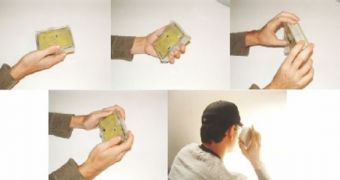Gadgets such as mobile phones, personal data assistants (PDA), remote controls, and personal music players have been the beneficiaries of a large number of innovations over the past few years, all designed to make their use a lot easier and more intuitive than it was when they were first conceived. But the new device created by MIT students Brandon Taylor and colleague Michael Bove goes beyond simple innovation. The groundbreaking design synthesizes all the modern contraptions mentioned above into a single soap-sized device, which can automatically tell what you want it to do.
In other words, the high-tech sensors this gadget has allow it to understand what you want to do with it, depending on how you hold it in your hands, and in you point it at. So, if you grab it by the sides and thrust it forward, it will immediately recognize that you want to take a picture of something, and the camera mode will automatically engage. Similarly, if you wish to answer your phone and lift your hand towards your ear, it will switch quickly to this mode.
“The ideal device would be a generic block, like a bar of soap, that knew the user's intent and could change its interface accordingly,” Taylor says. Still, their idea goes far beyond the most advanced innovation currently present on the market, namely towards cell phones that dim their light once they sense they are placed near the ear. This saves battery life, as otherwise the screen will remain lit for nothing.
Their soap-bar gadget design incorporates a three-axis accelerometer, so as to measure its own motion in a 3D environment, as well as 72 other sensors designed to process the way you keep your hands on, and, based on that, to extrapolate what you want to do.
Based on this preliminary design, the two already envision other applications for the technology as well. Taylor reveals that the idea could be used to create intelligent home appliances, which could understand when they are held incorrectly, or in a hazardous manner, and could alert you in order to avoid accidents. Golf clubs might also benefit from this innovation, as they could send feedback to their wielders, notifying them if they are about to execute a poor shot.

 14 DAY TRIAL //
14 DAY TRIAL //